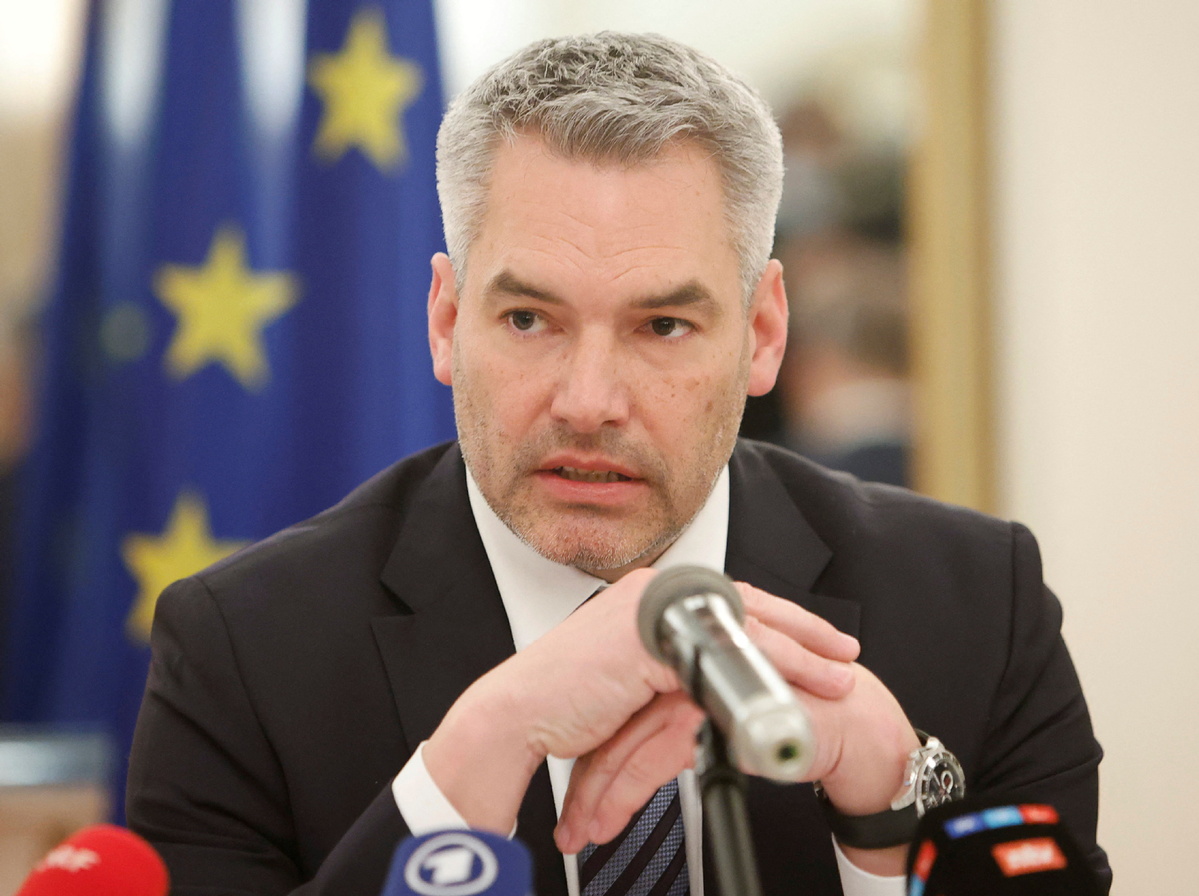'Direct' talks for Putin with Austria leader


'Open and tough' meeting, says chancellor of first Russia trip by EU figure amid crisis
Austrian Chancellor Karl Nehammer held "very direct, open and tough" talks with Russian President Vladimir Putin near Moscow on Monday, in Putin's first meeting with a European Union leader since Russia's special military operation in Ukraine started over six weeks ago.
Austria, which obtains 80 percent of its natural gas from Russia, generally maintains closer ties to Moscow than much of the European Union, but that has not been the case recently.
Nehammer has expressed solidarity with Ukraine, while his government has joined other EU countries in expelling Russian diplomats, albeit only a fraction of the large Russian diplomatic presence there.
"My most important message to Putin was that this war must finally end," Russia's state-run TASS news agency quoted him as saying shortly after the meeting at Putin's official residence outside Moscow.
A spokesman for Nehammer said the chancellor repeated previous comments that he had hoped to help bring an end to the conflict or improvements for Ukraine's beleaguered civilian population such as humanitarian corridors.
The Kremlin said little about the meeting. "The conversation was short, short according to current standards," Kremlin spokesman Dmitry Peskov was quoted as saying on Monday by Russia's RIA Novosti news agency.
When asked to comment on the Austrian chancellor's statement about a lack of optimism after the meeting, Peskov said he was unaware of the results of the negotiations.
The spokesman had said the closed-door meeting would not be followed by a joint news conference.
The Kremlin didn't reveal more details, but Peskov said Putin and Nehammer focused on the situation around Ukraine, as well as the issue of gas supplies, "because this topic is very relevant for the Austrian side".
Putin also had talks with his Belarusian counterpart Alexander Lukashenko in the Russian Far East.
Putin said that Moscow would counter attempts to isolate Russia and Belarus and stressed the need to deepen integration between the countries in light of Western sanctions, the RIA agency reported.
In other developments, the Japanese government on Tuesday approved additional sanctions against 398 people and 28 organizations from Russia in connection with its military operation.
In particular, deputies of the State Duma have fallen under sanctions, according to the website of the Japanese Foreign Ministry.
Russian Foreign Minister Sergey Lavrov said Russia's military operation is being fought partly to end the "total dominance" and "reckless expansion" of the United States on the world stage.
Response to expansion
"Our special military operation is designed to put an end to the reckless expansion and the reckless course toward the total dominance of the US-and the rest of the Western countries under them-in the international arena," he said.
The foreign minister also accused the US of not following international law.
"In Iraq, they saw a threat to their American security, they bombed it. And when neo-Nazis and ultra-radicals are being grown right on our borders … we are not allowed to react to this threat on our borders," Lavrov said.
On Tuesday, Serhii Haidai, the head of the Lugansk Regional Military Administration, claimed to have destroyed a Russian weapons depot in the region's Novoaidar district.
On the economic front, Hungary plans to pay for Russian gas in euros through Gazprombank, which will convert the payment into rubles to meet a new requirement set by Putin, Foreign Minister Peter Szijjarto said on Monday.
Putin has warned Europe it risks having gas supplies cut unless it pays in rubles as he seeks retaliation over Western sanctions for Moscow's military operation.
Agencies contributed to this story.
































